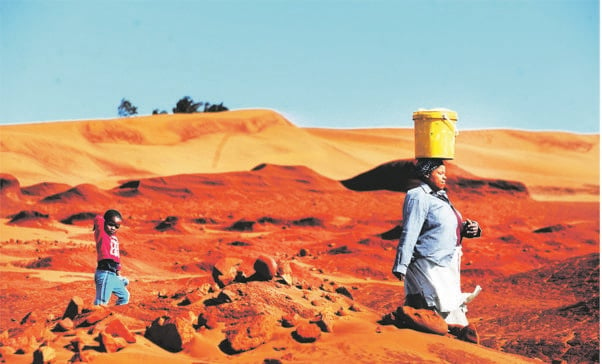
The response by Mineral Resources Minister Gwede Mantashe to two recent judgments about mining and the land rights of people living in former homelands has been instructive.
City Press has reported that Mantashe said the Pretoria High Court’s judgment on the Xolobeni case heralded the end of mining in South Africa because rural people would never consent to mining taking place on their land. Lawyers have conceded that 90% of new mining applications relate to land in former homelands, and it is well documented that poverty is most deeply concentrated in these areas.
This raises the question of why poor, unemployed people would strenuously oppose mining to the extent of risking their lives in the process. Two recent comprehensive reports provide some context.
The first is last year’s report from a high-level panel chaired by former president Kgalema Motlanthe. The second is this year’s report from the Human Rights Commission on mine-hosting communities. The reports lay bare the violence, intimidation, corruption, inequality and poverty that mining continues to produce.
Mining has had disastrous consequences for rural communities as there has been little to no consultation with those whose land rights are directly affected, and little to no compensation has been paid to those whose livelihoods are destroyed by mining. The poorest – and therefore the least powerful – are left to carry the costs of mining, including permanent environmental and social damage, while massive profits are generated from their ancestral land.
Why is this still allowed in post-apartheid South Africa? The answer is simple. From around the year 2000, government and the mining houses decided to ignore a short law that was enacted in 1996 to protect people whose land tenure rights were legally vulnerable as a result of past racial discrimination.
The Interim Protection of Informal Land Rights Act (IPILRA) gives effect to the right to tenure security contained in sections 25(6) and 25(9) of the Constitution. The IPILRA applies throughout the former homelands because people in those areas were denied recorded rights to land that they have occupied and used for generations.
The IPILRA refers explicitly to land rights derived from customary law. This is crucial because black people were denied common law ownership of their land, and the Constitutional Court has since upheld customary ownership of land as full ownership.
Read: Court rules in favour of community but Mantashe insists Xolobeni needs mining
The Pretoria High Court’s judgment in the Xolobeni, Eastern Cape, case and the Constitutional Court’s judgment in the , case say that mining cannot override the constitutionally required protections spelt out in the IPILRA.
Basically, Mantashe is up in arms because the Constitutional Court and the Pretoria High Court have said that mining houses, traditional leaders and government can no longer continue to disregard a law that has been on the statute books for more than 20 years.
The IPILRA provides that people may not be deprived of their informal rights without their consent, except by expropriation. The IPILRA and the Mineral and Petroleum Resources Development Act explicitly provide for the expropriation of land rights where the holders of the surface rights do not consent to mining on their land and it is in the interests of economic transformation to do so.
So when Mantashe and lawyers who represent the mining houses say that giving communities the right to say no will be the end of mining, they are being disingenuous as they are empowered by law to expropriate the surface rights of those who object to mining.
Expropriation is a hassle, however. Until recently, it has been the practice to pay off traditional leaders and start mining rather than calculate and negotiate the costs of
mining for the livelihoods of those whose land rights are directly affected before mining begins.
In this context, the Lesetlheng judgment on October 25 that compensation has to be determined upfront before mining has started fundamentally changes the balance of power.
Expropriation also means that the courts will monitor the process, including whether mining is actually in the public interest. Far too many mining rights are issued to people who want short-term profits at the expense of permanent damage to rural livelihoods and crucial shared resources such as water.
In essence, the judgments mean that mining houses will have to offer the people who are directly affected by it a fair deal if they want them to consent to mining.
When the mining boom shifted to the former homelands, many rural communities welcomed the mining houses because they hoped jobs and development would follow. But the widespread abuses that have been condoned and, to some extent, elicited by the department of mineral resources, have turned that hope into despair.
Rural people all around South Africa are engaged in life-or-death struggles to protect their land rights and demand accountability from government, traditional leaders and mining houses.
Instead of acknowledging the problems described in the two reports mentioned earlier and welcoming the clarity now provided by the Lesetlheng and Xolobeni judgments, Mantahse appears intent on appealing the Xolobeni judgment.
He is quoted in City Press as saying that the judgment will lead to corruption because it will enable rural communities to play different mining companies off against one another for their own profit. His assumption seems twofold – that it is government’s sole prerogative to profit from this role, and that communities are somehow incapable of acting in their rational self-interest.
Government and the mining companies have entered into a devil’s compact to ignore and undermine the property rights and decision-making authority of rural people provided that mining profits and opportunities are distributed to politically connected BEE partners. They should pause to think about the message that they are sending to the majority of South Africans about the sanctity of private property and the rule of law.
Are there no mining companies out there who see the judgments as an opportunity instead of a threat? They provide the chance to stop paying off politicians and traditional leaders, and instead deal directly with the families and individuals affected by mining.
How expensive can it be to play open cards and offer people alternative land and livelihoods that are attractive enough to make them want to live alongside mining?
Urban South Africans are not paying attention to how Parliament is systematically reproducing structural inequality by enacting laws like the Minerals and Petroleum Resources Development Act and the Traditional Leadership and Governance Framework Act.
Worse than either of these laws is the Traditional and Khoi-San Leadership Bill, which is in the final stages of adoption in Parliament. Last-minute changes to the bill seek
to get around the Lesetlheng and Xolobeni judgments by empowering traditional leaders to sign deals directly with third parties such as mining houses.
The amendments seek to negate the consent requirements of the IPILRA by saying that traditional leaders can unilaterally sign such deals “notwithstanding other laws”.
This pathetic response to the judgments will not survive constitutional scrutiny, but a legal challenge to the bill will take some years to reach the Constitutional Court. In the meantime, the looting will continue, and the same people who bore the brunt of forced removals and past dispossession will lose the residual assets they managed to hold on to until the end of apartheid.
Claassens is the director of the Land & Accountability Research Centre at the University of Cape Town




 Publications
Publications
 Partners
Partners









